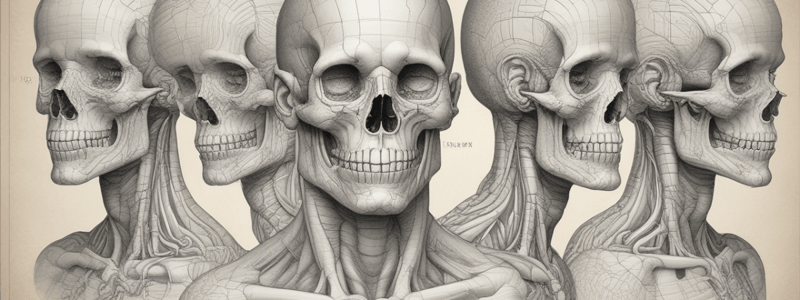Podcast
Questions and Answers
What is the function of capillaries in the body?
What is the function of capillaries in the body?
- To regulate body temperature
- To connect arteries to veins and transport nutrients (correct)
- To carry oxygen to the cells
- To produce red blood cells
Which body system consists of groups of organs acting together to perform functions?
Which body system consists of groups of organs acting together to perform functions?
- Integumentary System
- Body Systems (correct)
- Central Nervous System
- Endocrine System
Where is the buccinator muscle located in the body?
Where is the buccinator muscle located in the body?
- In the calf region
- On the forehead
- Around the heart
- Between the upper and lower jaws (correct)
What is the role of the cell membrane in a cell?
What is the role of the cell membrane in a cell?
Which nerve affects the muscles of the mouth?
Which nerve affects the muscles of the mouth?
What are centrioles and what is their role in cell division?
What are centrioles and what is their role in cell division?
Which part of the body does the cervical cutaneous nerve affect?
Which part of the body does the cervical cutaneous nerve affect?
What is the function of the brain?
What is the function of the brain?
What is contained within the cranium?
What is contained within the cranium?
Flashcards are hidden until you start studying
Study Notes
Capillaries
- Capillaries are small blood vessels that connect arterioles and venules.
- They facilitate the exchange of oxygen, carbon dioxide, nutrients, and waste products between blood and tissues.
Organ Systems
- The body is organized into systems; the organ system consists of groups of organs working collectively to perform specific functions, such as the digestive or respiratory system.
Buccinator Muscle
- The buccinator muscle is located in the mouth, forming the wall of the cheeks and aiding in facial expressions and chewing.
Cell Membrane
- The cell membrane, also known as the plasma membrane, regulates the passage of substances in and out of the cell, maintaining homeostasis and protecting cellular integrity.
Nerve Affecting Mouth Muscles
- The facial nerve is responsible for controlling the muscles of the mouth, enabling actions such as smiling and chewing.
Centrioles
- Centrioles are cylindrical structures found in animal cells that play a crucial role in cell division by organizing the mitotic spindle, ensuring proper chromosome separation.
Cervical Cutaneous Nerve
- The cervical cutaneous nerve affects areas of the neck and skin, providing sensory information from these regions to the brain.
Function of the Brain
- The brain serves as the control center for the body, processing sensory information, coordinating responses, and regulating vital functions like breathing and heart rate.
Cranium Contents
- The cranium houses and protects the brain, containing cerebrospinal fluid, blood vessels, and connective tissues critical for brain function and protection.
Studying That Suits You
Use AI to generate personalized quizzes and flashcards to suit your learning preferences.




